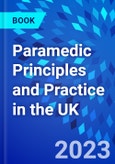Paramedic Principles and Practice in the UK is a key textbook designed to support paramedicine students in this country throughout their studies.
The volume takes a practical approach, with case histories covering a broad range of clinical presentations and treatments, all incorporating a patient-centric perspective that acknowledges the longer patient journey.
This must-have textbook will not only arm readers with technical knowledge and expertise, but also with the non-technical principles of the profession, developing future paramedics who are able to provide a safe and effective management plan in the out-of-hospital environment.
- Aligned to UK paramedicine curricula
- More than 40 detailed case studies covering essential pathologies most commonly seen by UK paramedics, as well as less typical scenarios
- Evidence-based clinical decision-making models to support paramedics in practice
- Essential physiological concepts to help readers bridge the gap from principles to practice
- Focus on the wellbeing of both the patient and the paramedic
- Useful appendices including medications commonly encountered in paramedic settings
Table of Contents
The Key to improving your clinical practice
Acknowledgements
1�Introduction
Part 1 PARAMEDIC PRINCIPLES
Section 1: Principles of Paramedic Practice
2�The paramedic role in healthcare
3�Characteristics of ambulance patients
Section 2 The Paramedics Clinical Approach
4�The structured clinical approach
5�The clinical reasoning process
6�The patient interview
Section 3 Patient and Paramedic Safety
7�Patient safety and paramedicine
8�Paramedic health and wellbeing
Section 4: Paramedic Education
9�Paramedic education
Section 5: Legal and Ethical Considerations
10�Legal and ethical considerations in clinical decision making
Section 6: Clinical Reasoning and the Paramedic Model of Practice
11�Developing a philosophy of practice
PART 2 ESSENTIAL KNOWLEDGE
Section 18:� Essential Concepts of Paramedic Practice
55�Perfusion
56�The autonomic response
57�The inflammatory response
PART 3 PARAMEDIC PRACTICE
Section 7: The Paramedic Approach to the Patient in an Altered Conscious State
12�Hypoglycaemia
13�Cerebrovascular accidents
14�Overdose
15�Seizures
Section 8: The Paramedic Approach to the Patient in Respiratory Distress
16�Airway Obstruction
17�Asthma
18�Acute pulmonary oedema
19�Chronic obstructive pulmonary disease
20�Pneumothorax
21�Pulmonary embolism
22 �Pleural effusion
23�The paediatric patient with a noisy airway
Section 9: The Paramedic Approach to the Patient Suffering a Cardia Emergency
24�Chest pain
25�Arrhythmias
26�Cardia arrest
Section 10: The Paramedic Approach to the Patient with a Severe Allergic Reaction
27�Anaphylaxis
Section 11: The paramedic Approach to the Patient Presenting with Pain
28 �Pain
29�Lower back pain
30�Renal colic
Section 12: The Paramedic Approach to the Trauma Patient
31�The structured clinical approach to trauma patients
32�Head injuries
33�Chest injuries
34�Musculoskeletal injuries
35�Traumatic spinal injuries
36�Burns
Section 13: The Paramedic Approach to the Patient Presenting with Environmental Injury
37�Hypothermia
38�Hyperthermia
39�Decompression injuries
40�Snake bites
41�Spider bites
42�Marine envenomation
Section 14: The Paramedic Approach to the Unwell Patient: Specific Challenges to Paramedic Reasoning
43�Acute abdominal pain
44�Sepsis
45�Bleeding from the gastrointestinal and urinary tract
Section 15: The Paramedic Approach to Complex Cases: Specific Challenges to Paramedic Reasoning and Management
46�The social isolated patient
47�The dying patient
48�The patient on out-of-hospital dialysis
49�Indigenous Australian patients
50� Maori patients
Section 16: The paramedic Approach to the Patient Displaying Abnormal Behaviour
51�The patient displaying abnormal behaviour
52�De-escalation in the pre-hospital environment
Section 17:� The Paramedic Approach to Obstetric and Neonatal Emergencies
53�Imminent birth
54�Neonatal resuscitation
Appendix 1:� Professional roel guide
Appendix 2: Medications commonly encountered in community emergency health
Glossary
Index
Authors
Aidan Ward Senior Lecturer, Paramedic ScienceProgramme Lead, BSc (Hons) Paramedic Science
University of Northampton
Northampton, UK.








